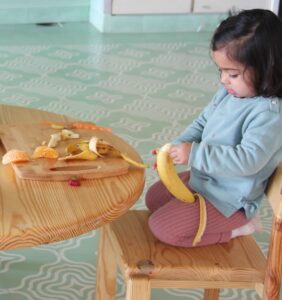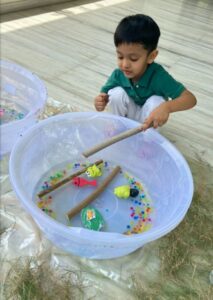30 Nov How to support your young child with home learning
There is no fixed place for learning!
Children learn wherever they are, not in just special learning places.
For young children, learning at home is a different experience than the one provided in school. The environment, the company and the hours of availability to unavailability of parents/ elders and resources contribute significantly to their learning process. Life skills, personality formation and guidance to a child, through role modeling of parents, elders around and social engagement with family members comprises learning along with subject matter expertise. Hence, it becomes imperative to provide them with an encouraging learning home environment.
How can one make home a place where the child integrates all his/ her learnings, observations, and knowledge of the day and create a more holistic sense of it? The easiest way to initiate home learning for kids is to provide ample opportunities by engaging them in daily chores and simple tasks at home. We can ensure that while these little ones are busy doing these small tasks, we can help in enriching their learning abilities and capacities by tweaking and modifying them a little. Some are very simple yet crucial things that can be ensured to support learning at home like:
Chores as learning places and bonding time
We need to agree that any effort of learning is more effective with a good bonding and it is an important catalyst in making home environments supportive. Involving kids in daily routine tasks like preparing the table, helping with the laundry, gardening or doing dishes gives one-to-one time to develop deeper bonding. Child Mind Institute suggests that, “Helping with chores (also) provides great opportunities for the development of executive functions like planning and problem solving. Cooking is another way to explore mathematical concepts and to practice reading, following directions, planning and organization, patience and frustration tolerance.”
Attention with the presence
Attention from parents, elders, grandparents encourages kids to perform to their best abilities. Being involved in a given task along with their elders builds a sense of responsibility in kids. Kids look for encouragement in all the little things they do, these little encouragements help them to be confident & gives them the confidence to explore & experiment without any hesitation. Making yourself available for kids, even for the littlest of their needs; like answering their curious questions, inquiring them about what they are doing or how it can be done, being there and observing what they are creating and intervening when you think you can help sustain their interest will help these curious learners learn better and quicker. Encouragement at all times helps these kids to take their work seriously and get involved in whatever they are doing. Routine things for us could have motivational value for kids; to know that the night time reading sessions include vivid storytelling scenes with you snuggling next to them, can feel rewarding for them. Sitting next to them while they are engrossed enjoying their favourite cartoon can help in stronger bonding.
Also, it doesn’t mean you are required to hover over kids all the time of the day. It is called giving them space and having one of your own too. Setting certain activities or tasks like worksheets, projects, labeling as child led, which does not require your presence will help them navigate things independently and will also make them self reliant and confident in what they do.
Patience
Patience is a virtue, just like parenting.
We parents, as adults, get easily irked up with the mess that happens when planning any activity with the kids at home. The first thing we need to undo about ourselves is to relax and not get worked up with the little chaos and mess around while facilitating a learning process at home for kids. If you can control your behaviour when everything around you is out of control, you can model for your children a valuable lesson in patience and understanding. This will allow them to explore freely and learn from the mess and mistakes too.
Plan ahead
Planning the next day or even a couple of days together and mostly sticking to it, help kids to prepare themselves for what is awaiting. These are structured stimulations. It also helps them to understand how planning and a routine clears a lot of daily chaos and keeps them organized with productive hours with pleasure time too during the day. There can always be some changes made to the plan according to the mood and requirements than to follow strict schedules. Make sure to involve your little one in the process of planning; like discussing and planning the next day’s meals or devising an activity involving all the family members on the weekend or where they would like to go in the evening, would they like to meet someone particular that week and many more. The process will make them understand that they have a task in hand and will look forward to it.
Know learning preferences
Some children are more expressive of their ideas while walking around the space near you doing random things. Some may require a proper sitting place where they are at peace and focused in their thoughts while some learn better when they are out in the open. Knowing what situation would be best for your child to learn comfortably would enhance the process and make it less cumbersome for you to struggle with your child into disciplined learning. This works best with special kids to feel less intimidated and find their techniques to focus.
Creativity
Creativity starts at home and lasts for a lifetime.
Turn mundane routines into fun things by slipping in your little creative ideas. Let’s prepare the shopping list for a game night on the weekend, count and write invites to their friends and family members, decide and arrange for the games, and select prizes. Making them in charge of things will keep them involved. Provide meaningful alternatives to watching TV, video games, and miracle phones. Lookup for innumerable easy suggestions for home activities available on the internet and inculcate them. Take impromptu tours or visits to places where using visual stimulations aids learning happens faster by drawing attention of kids.
Juggling between multiple roles and daily routines as adults, it is not a compulsion to provide a perfect environment for your kids. But understanding that whatever you are providing is worth the effort and does not require you to beat yourself up for the limited resources will be enough for the child’s needs. Let each moment together become valuable by letting them identify and know the same.




No Comments